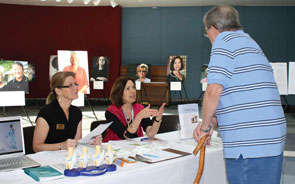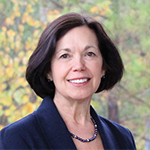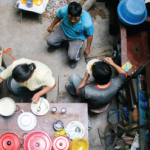
While growing up, researcher Leigh Callahan, PhD, had no specific blueprint for a future career, but her love for math as a youngster eventually drew her to a profession that suits her well.
To her knowledge, when she was a child, there were no epidemiologists living in her hometown of Rutherfordton, N.C. She jokes that the town was so small, there were probably more letters in its name than people living there.
Lured by the field of medicine but with no desire to become a physician, Dr. Callahan has devoted more than two decades to studying health disparities in relation to personal and family income. She is not keen on needles, but data and numbers are a different story.
“I like thinking about medicine and health outcomes, and I always, as a child, liked math and statistics, so I think epidemiology is sort of really a perfect fit for me,” she says.
Dr. Callahan obtained a bachelors degree in radiologic science from the University of North Carolina (UNC), Chapel Hill, and a PhD in public policy from Vanderbilt University in Nashville. Her long-time interest in arthritis began with her first research endeavor as a graduate student at Vanderbilt when she collaborated withTheodore Pincus, MD, to develop and refine ways to measure feelings of helplessness among people with the disease.
“I started years ago in a retrospective follow-up study in rheumatoid arthritis where we saw that education made a difference in predicting mortality,” says Dr. Callahan.
That study was the starting point for Dr. Callahan, who wrote her PhD dissertation on evaluating the construct of learned helplessness. She later investigated links between income disparities and how, in particular, where you live can make a difference in your overall health.
“My interest has been the role of individuals in their own health outcomes,” says Dr. Callahan, who notes that people who are poor and battling arthritis are far less likely to triumph over a debilitating disease.
“I’m looking at socioeconomic status, so looking at an individual’s education level, their occupation, their income, and how that affects their health outcomes,” such as disease prevalence and mortality.
Research indicates that most common chronic diseases are more prevalent and have a higher morbidity and increased mortality in individuals with lower levels of socioeconomic status, says Dr. Callahan.
Diverse Accomplishments
Before taking on her present position as a professor of medicine and social medicine and director of Multidisciplinary Clinical Research at UNC Thurston Arthritis Research Center, Dr. Callahan worked at the Centers for Disease Control and Prevention (CDC) as the first full-time epidemiologist in the arthritis program. During her three-year stint at the CDC, she cultivated cooperation between government and the Arthritis Foundation.

